SDG 4 - Quality Education
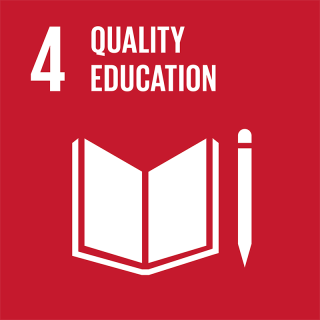
As we approach the end of Global Goals week, Eurostat recently published an EU update on education attainment levels. The Sustainable Development Goal (SDG 4) 'Quality education' set the goal of ensuring access to quality education right the way through from pre school to adult and lifelong learning. As well as measuring formal qualifications, SDG 4 also "aims to increase the numbers of youths and adults having relevant skills for employment, decent jobs and entrepreneurship. Furthermore, SDG 4 envisions the elimination of gender and income disparities in access to education".
Across the EU
In 2021, 54 per cent of people aged 16 to 74 had at least basic digital skills. This level has not changed since 2016. 10.8 per cent of people aged 25 to 64 engaged in adult learning, an increase of 0.5 percentage points since 2016. 41.2 per cent of people aged 25 to 34 attained a third level qualification in 2021, an increase of 4.4 percentage points since 2016. 9.7 per cent of people aged between 18 and 24 left school early in 2021, a decrease of 0.9 percentage points on 2016.
Educational attainment is one of the key determinants of labour market outcomes for an individual. Education not only benefits the individual, but society as a whole gains. The potential impact of digital transition on the labour market makes access to education and training throughout adulthood a priority. The poor labour market status of early school leavers points to the need for a continued focus on this cohort and on addressing educational disadvantage. As we move towards a future where digital transformation will disrupt the labour market, having the greatest impact on people with lower levels of education and skills it is important that this cohort are not left behind.
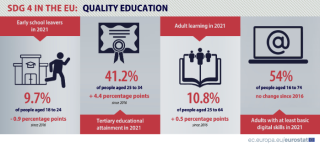
Ireland
SDG4 advocates inclusive and equitable quality education and promotes lifelong learning opportunities for all. Education is seen as key in meeting other SDGs; it aims at reducing poverty, inequality, gender inequality and contributes to growth, employment, productivity, innovation, competitiveness and healthier lifestyles. In Social Justice Ireland's Annual Sustainable Progress Index 2022, Ireland scores highest on two indicators: childhood education and second level education. Good performance is also seen for third level education outcomes, early leavers from education and on the Programme for International Student Assessment (PISA) score. Although Ireland’s track record on the employment of recent graduates has generally been positive, the latest data on this indicator is less favourable (though still high) relative to other countries; it is likely the data shows the impact of Covid-19 on employment opportunities for this cohort. The indicator score that reflects life-long learning (adult participation in learning as a percentage of the population) also suggests improvement is required. Overall however, the positive performance of several measures mean that Ireland scores very well on this SDG.
Third Level
The figures from Eurostat for Ireland show that in 2021, 61.7 per cent of 25 to 34 year olds had achieved a third level qualification.
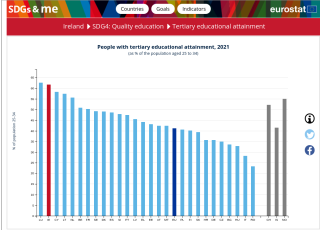

GIVING A VOICE TO THOSE
WHO DON’T HAVE A VOICE
When you support Social Justice Ireland, you are tackling the causes of problems.
Adult Learning
In 2021, 13.6 per cent of 25 to 64 year olds in Ireland were engaged in adult learning.
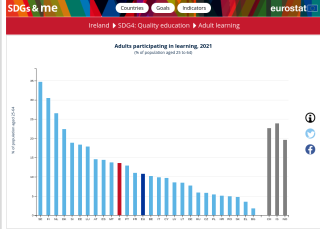
Early School Leavers
In 2021, 3.3 per cent of 18 to 24 year olds left school early.
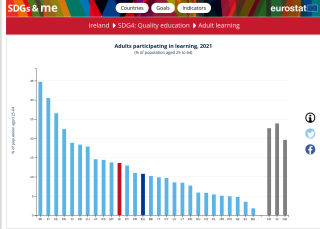
Basic Digital Skills
In Ireland, 70 per cent of 16 to 74 year olds has basic digital skills in 2021.
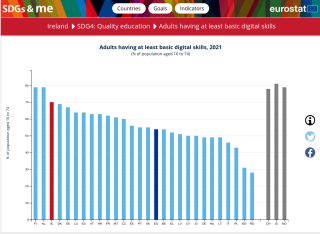
Accessible and high quality education and training across the life cycle will support people to become active and engaged citizens, and equip them with the necessary critical and creative skills to navigate an ever-changing employment environment. Ireland is making progress but concerns remain regarding early school leaving and the poor labour market outcomes for people with low or no formal educational qualifications.
Participation in high quality education has benefits not only for young people themselves but also for taxpayers and society. These benefits typically last over the course of an individual’s lifetime. According to the OECD adults with a tertiary degree in Ireland earn on average 81 per cent more than adults with upper secondary education. They are more likely to be employed, the employment rate is 11 percentage points higher for degree holders than for those with an upper secondary or post-secondary non-tertiary education. [1] Socio-economic disadvantage also follows a student throughout the education system with younger graduates from more affluent areas earning around €2,000 more a year on average than their peers from disadvantaged areas. Even when controlling for different factors, graduates from disadvantaged backgrounds earn more than €600 less after graduation than others. [2] This presents a challenge to policymakers, and points to the value of investing in education at all stages, and the particular importance of investing in early childhood education, and a continued focus on tackling educational disadvantage. The benefits of investing in education, both to the individual, to the economy and to society, far outweigh any initial outlay of resources. This is something that should be at the forefront of decisions regarding the investment and resourcing of our education system as a whole.
[1] OECD (2019) “Ireland”, in Education at a Glance 2019: OECD Indicators, Paris: OECD Publishing.
[2] Higher Education Authority (2020) Graduate Survey Outcomes Class of 2018. Dublin: HEA
